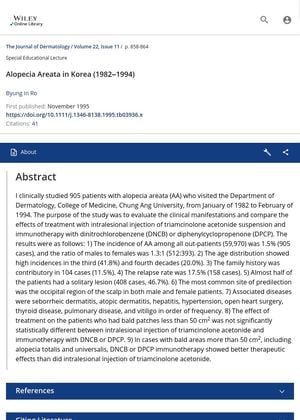Alopecia Areata in Korea (1982–1994)
November 1995
in “
The Journal of Dermatology
”

TLDR Alopecia areata was most common in people in their 30s and 40s, with some family history and a higher relapse rate, and larger bald areas responded better to specific immunotherapy.
The study conducted by Byung In Ro at Chung Ang University examined 905 patients with alopecia areata (AA) from 1982 to 1994 to assess clinical features and treatment efficacy. The incidence of AA was 1.5% among 59,970 outpatients, with a male-to-female ratio of 1.3:1. High incidence was noted in the third and fourth decades of life, and 11.5% had a family history of AA. The relapse rate was 17.5%, and nearly half of the patients had a solitary lesion, predominantly in the occipital scalp region. Associated conditions included seborrheic dermatitis and atopic dermatitis, among others. Treatment with intralesional triamcinolone acetonide and immunotherapy with DNCB or DPCP showed no significant difference for bald patches under 50 cm². However, for larger bald areas, including alopecia totalis and universalis, DNCB or DPCP immunotherapy was more effective than triamcinolone acetonide injections.



